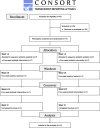The feasibility of a randomized controlled crossover trial to assess the effect of probiotic and prebiotic supplementation on the health of elite wheelchair athletes
- PMID: 37322538
- PMCID: PMC10268368
- DOI: 10.1186/s40814-023-01339-6
The feasibility of a randomized controlled crossover trial to assess the effect of probiotic and prebiotic supplementation on the health of elite wheelchair athletes
Abstract
Background: Gastrointestinal (GI) problems represent a health burden in Para athletes and can ultimately reduce athletic performance. This study aimed to evaluate the feasibility of a randomized controlled crossover trial (RCCT) assessing the effects of probiotic and prebiotic supplementation on the health of Swiss elite wheelchair athletes.
Methods: The RCCT was conducted between March 2021 and October 2021. Athletes were randomized to receive either a daily probiotic (3 g of probiotic preparation, including eight bacterial strains), or a daily prebiotic (5 g of oat bran) supplementation first. After the first supplementation phase (4 weeks), a washout period (4 weeks) and the second crossover supplementation phase (4 weeks) followed. Data were collected at four study visits (every 4 weeks) and included 3-day training and nutrition diaries, the Gastrointestinal Quality of Life Index (GIQLI) questionnaire, stool samples, and fasting blood samples. The study assessed the feasibility criteria such as recruitment rate, retention rate, success of data collection, adherence to the protocol, willingness to participate, and safety.
Results: This pilot study met the majority of the predefined minimum requirements for the feasibility criteria. Out of 43 invited elite wheelchair athletes, 14 (33%) consented (mean (standard deviation) age: 34 (9) years, eight females, 11 with a spinal cord injury). The desired sample size was not reached, but the achieved recruitment rate was modest, especially considering the population studied. All participating athletes completed the study. With the exception of one missing stool sample and two missing diaries, data were successfully collected for all athletes at all four visits. Most athletes adhered to the daily intake protocol for at least 80% of the days, both for probiotics (n = 12, 86%) and prebiotics (n = 11, 79%). Ten (71%) athletes would be willing to participate in a similar study again. No serious adverse events occurred.
Conclusion: Despite the limited number of elite wheelchair athletes in Switzerland and the modest recruitment rate, the implementation of a RCCT in elite wheelchair athletes is feasible. The data collected in this study provide essential information for the design of the subsequent study which will include a larger cohort of physically active wheelchair users.
Trial registration: Swiss Ethics Committee for Northwest/Central Switzerland (EKNZ), 2020-02337).
Clinicaltrials: gov, NCT04659408.
Keywords: Bowel; Feasibility; Gastrointestinal problems; Microbiome; Paralympic; Prebiotic; Probiotic; Spinal cord injury.
© 2023. The Author(s).
Conflict of interest statement
The authors declare that they have no competing interests.
Figures
Similar articles
-
Gut microbiome and inflammation among athletes in wheelchair in a crossover randomized pilot trial of probiotic and prebiotic interventions.Sci Rep. 2024 Jun 4;14(1):12838. doi: 10.1038/s41598-024-63163-z. Sci Rep. 2024. PMID: 38834634 Free PMC article. Clinical Trial.
-
The feasibility of a crossover, randomized controlled trial design to assess the effect of probiotics and prebiotics on health of elite Swiss para-athletes: a study protocol.Pilot Feasibility Stud. 2022 Apr 27;8(1):94. doi: 10.1186/s40814-022-01048-6. Pilot Feasibility Stud. 2022. PMID: 35477496 Free PMC article.
-
Impact of probiotic supplementation on exercise endurance among non-elite athletes: study protocol for a randomized, placebo-controlled, double-blind, clinical trial.Trials. 2022 Jul 27;23(1):603. doi: 10.1186/s13063-022-06552-x. Trials. 2022. PMID: 35897037 Free PMC article.
-
Supplementation of Probiotics and Its Effects on Physically Active Individuals and Athletes: Systematic Review.Int J Sport Nutr Exerc Metab. 2019 Sep 1;29(5):481-492. doi: 10.1123/ijsnem.2018-0227. Int J Sport Nutr Exerc Metab. 2019. PMID: 30676130
-
Physiology of wheelchair racing in athletes with spinal cord injury.Sports Med. 2002;32(1):23-51. doi: 10.2165/00007256-200232010-00002. Sports Med. 2002. PMID: 11772160 Review.
Cited by
-
Tailored nutrition strategies for Paralympic athletes: addressing unique energy, nutrients, and hydration needs to enhance performance and health.Front Nutr. 2025 Jul 7;12:1572961. doi: 10.3389/fnut.2025.1572961. eCollection 2025. Front Nutr. 2025. PMID: 40693203 Free PMC article. Review.
-
Energy Availability and Nutritional Intake during Different Training Phases of Wheelchair Athletes.Nutrients. 2023 May 31;15(11):2578. doi: 10.3390/nu15112578. Nutrients. 2023. PMID: 37299541 Free PMC article. Clinical Trial.
-
Probiotic supplementation for optimizing athletic performance: current evidence and future perspectives for microbiome-based strategies.Front Nutr. 2025 Jul 15;12:1572687. doi: 10.3389/fnut.2025.1572687. eCollection 2025. Front Nutr. 2025. PMID: 40735239 Free PMC article. Review.
-
Gut microbiome and inflammation among athletes in wheelchair in a crossover randomized pilot trial of probiotic and prebiotic interventions.Sci Rep. 2024 Jun 4;14(1):12838. doi: 10.1038/s41598-024-63163-z. Sci Rep. 2024. PMID: 38834634 Free PMC article. Clinical Trial.
References
-
- Steffen K, Clarsen B, Gjelsvik H, Haugvad L, Koivisto-Mørk A, Bahr R, et al. Illness and injury among Norwegian para athletes over five consecutive paralympic summer and winter games cycles: prevailing high illness burden on the road from 2012 to 2020. Br J Sports Med. 2022;56(4):204–212. doi: 10.1136/bjsports-2021-104489. - DOI - PubMed
-
- Derman W, Schwellnus MP, Jordaan E, Runciman P, Van de Vliet P, Blauwet C, et al. The incidence and patterns of illness at the Sochi 2014 winter paralympic games: a prospective cohort study of 6564 athlete days. Br J Sports Med. 2016;50(17):1064–1068. doi: 10.1136/bjsports-2016-096215. - DOI - PubMed
Associated data
LinkOut - more resources
Full Text Sources
Medical
Miscellaneous



